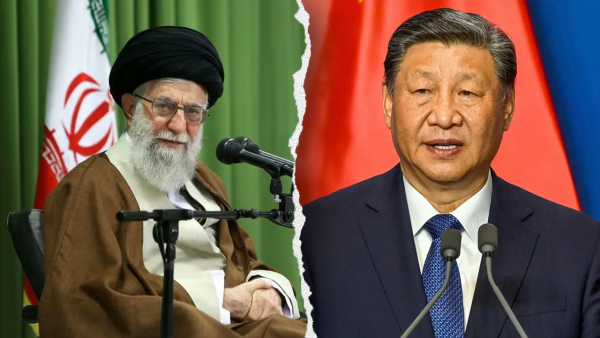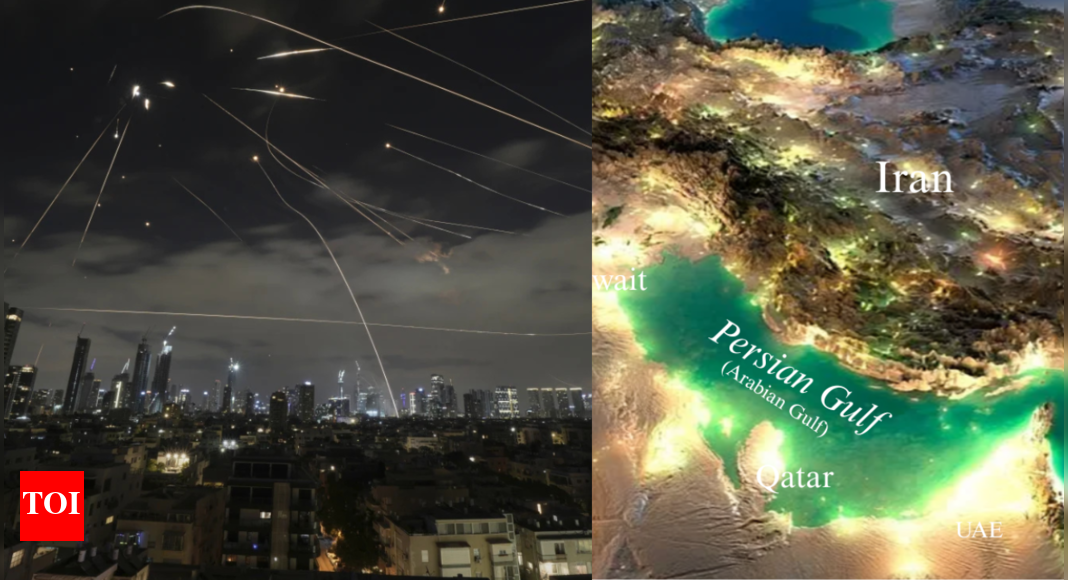China's Iran Policy: Retribution Or Worrying Response?

Welcome to your ultimate source for breaking news, trending updates, and in-depth stories from around the world. Whether it's politics, technology, entertainment, sports, or lifestyle, we bring you real-time updates that keep you informed and ahead of the curve.
Our team works tirelessly to ensure you never miss a moment. From the latest developments in global events to the most talked-about topics on social media, our news platform is designed to deliver accurate and timely information, all in one place.
Stay in the know and join thousands of readers who trust us for reliable, up-to-date content. Explore our expertly curated articles and dive deeper into the stories that matter to you. Visit Best Website now and be part of the conversation. Don't miss out on the headlines that shape our world!
Table of Contents
China's Iran Policy: Retribution or Worrying Response?
China's burgeoning relationship with Iran has sparked considerable debate globally. Is it a calculated response to perceived Western aggression, or a genuinely worrying development with significant geopolitical ramifications? The increasingly close ties between Beijing and Tehran demand careful scrutiny, analyzing both the potential benefits for China and the broader implications for regional stability and international security.
A Deepening Partnership:
China and Iran have significantly deepened their economic and political ties in recent years, most notably through the 25-year Comprehensive Cooperation Program signed in 2021. This agreement outlines a broad framework for collaboration across various sectors, including energy, infrastructure, and technology. For China, this partnership offers several advantages:
- Access to crucial energy resources: Iran possesses significant oil and gas reserves, vital for China's energy security and economic growth. The partnership secures a reliable source, potentially reducing dependence on other volatile regions.
- Strategic counterbalance to the West: By strengthening its relationship with Iran, China can challenge the perceived dominance of the United States and its allies in the Middle East. This serves as a powerful geopolitical tool, particularly given ongoing tensions with the West.
- Expansion of its Belt and Road Initiative (BRI): Iran’s geographical location makes it a critical node in the BRI, connecting China to Europe, Africa, and beyond. Investing in Iranian infrastructure strengthens this vital trade route.
Concerns and Criticisms:
However, the burgeoning relationship isn't without its critics. Several concerns warrant attention:
- Nuclear proliferation risks: Iran's nuclear program remains a significant point of contention internationally. Closer ties with China could embolden Iran, potentially undermining international efforts to prevent nuclear proliferation. This concern is amplified by reports of increased Chinese investment in Iranian nuclear infrastructure, though China denies these claims directly contribute to weapons development.
- Human rights violations: Iran's human rights record is abysmal, with widespread concerns about political repression, censorship, and the persecution of minorities. China's continued engagement with Iran despite these violations raises ethical questions and risks undermining international efforts to improve the human rights situation.
- Regional instability: A closer China-Iran alliance could exacerbate existing regional tensions, potentially fueling proxy conflicts and further destabilizing an already volatile region. This has the potential to impact global energy markets and create wider humanitarian crises.
Is it Retribution or Worry?
Whether China's Iran policy is best described as "retribution" or a "worrying response" is a matter of perspective. While it undoubtedly serves as a counterbalance to Western influence, the potential risks associated with this deepening partnership are substantial. For China, the benefits of access to resources and strategic leverage are clear, but these gains must be weighed against the potential for exacerbating regional instability and undermining international norms regarding nuclear proliferation and human rights.
Moving Forward:
The international community must carefully monitor the evolving China-Iran relationship. Open dialogue and engagement are crucial to mitigate potential risks. Pressure on both China and Iran to adhere to international norms and regulations is essential to ensure regional stability and prevent the further escalation of tensions. The future implications of this deepening partnership remain to be seen, but understanding the complexities and potential consequences is paramount. Further research into the specifics of the 25-year agreement and its practical implementation is vital for a clearer understanding. Ignoring this significant development would be a grave mistake. What is your take on this evolving relationship? Share your thoughts in the comments below.

Thank you for visiting our website, your trusted source for the latest updates and in-depth coverage on China's Iran Policy: Retribution Or Worrying Response?. We're committed to keeping you informed with timely and accurate information to meet your curiosity and needs.
If you have any questions, suggestions, or feedback, we'd love to hear from you. Your insights are valuable to us and help us improve to serve you better. Feel free to reach out through our contact page.
Don't forget to bookmark our website and check back regularly for the latest headlines and trending topics. See you next time, and thank you for being part of our growing community!
Featured Posts
-
 Ben Felters Success A Proud Moment For Girlfriend Cameron Brink
Jun 22, 2025
Ben Felters Success A Proud Moment For Girlfriend Cameron Brink
Jun 22, 2025 -
 Trump Loses Mlb Stars Backing Amidst Potential Us War
Jun 22, 2025
Trump Loses Mlb Stars Backing Amidst Potential Us War
Jun 22, 2025 -
 Tze Elim Bet Disaster The Unintended Consequences Of Israels Failed Operation Bramble Bush
Jun 22, 2025
Tze Elim Bet Disaster The Unintended Consequences Of Israels Failed Operation Bramble Bush
Jun 22, 2025 -
 Cantor Fitzgerald Raises Stake In Defense Giant Lockheed Martin Nyse Lmt
Jun 22, 2025
Cantor Fitzgerald Raises Stake In Defense Giant Lockheed Martin Nyse Lmt
Jun 22, 2025 -
 Sparks Struggle Without Kelsey Plum Suffer Crushing Loss To Storm
Jun 22, 2025
Sparks Struggle Without Kelsey Plum Suffer Crushing Loss To Storm
Jun 22, 2025
Latest Posts
-
 Over 100 Heirs Telegrams Pavel Durovs Inheritance Strategy Revealed
Jun 22, 2025
Over 100 Heirs Telegrams Pavel Durovs Inheritance Strategy Revealed
Jun 22, 2025 -
 Jaws 50th Anniversary Separating Fact From Fiction In Shark Attack Statistics
Jun 22, 2025
Jaws 50th Anniversary Separating Fact From Fiction In Shark Attack Statistics
Jun 22, 2025 -
 Fears Rise In Qatar Increased Radiation Monitoring Following Iranian Nuclear Site Strikes
Jun 22, 2025
Fears Rise In Qatar Increased Radiation Monitoring Following Iranian Nuclear Site Strikes
Jun 22, 2025 -
 Elite Israeli Soldiers Deaths Examining The Failures Of Operation Bramble Bush
Jun 22, 2025
Elite Israeli Soldiers Deaths Examining The Failures Of Operation Bramble Bush
Jun 22, 2025 -
 Palestine Action Government Crackdown Following Base Break In
Jun 22, 2025
Palestine Action Government Crackdown Following Base Break In
Jun 22, 2025
